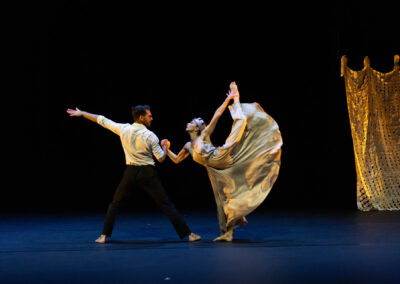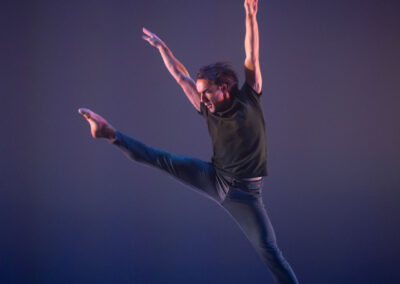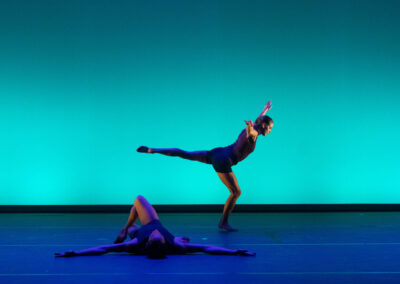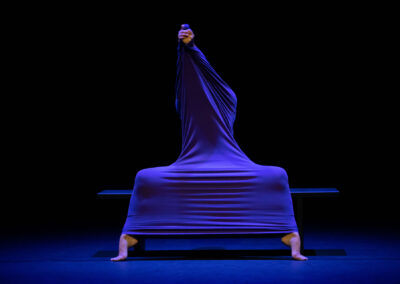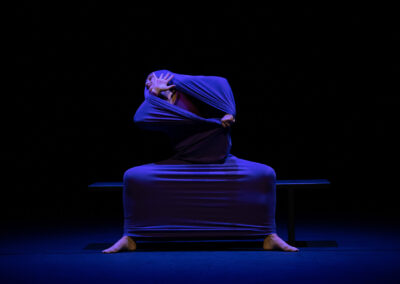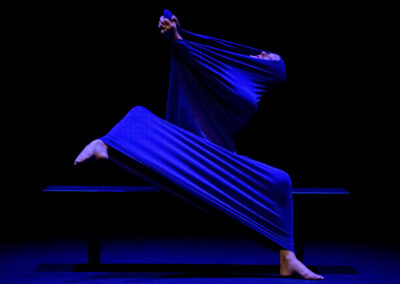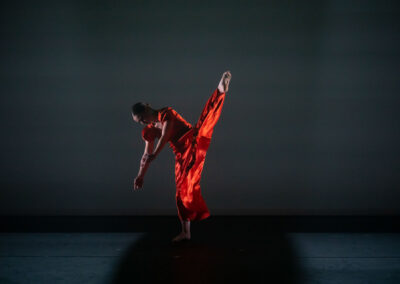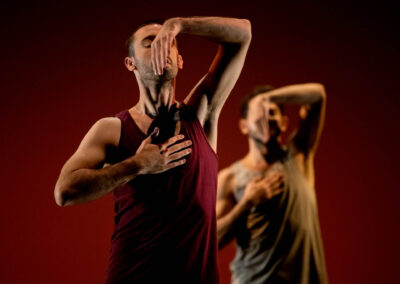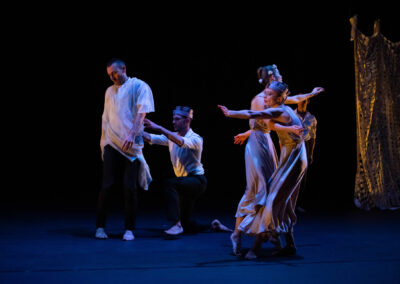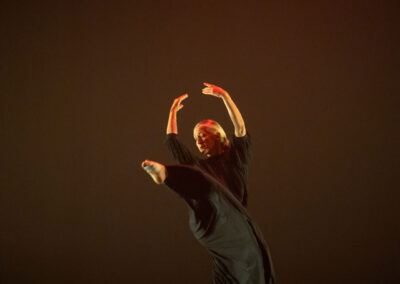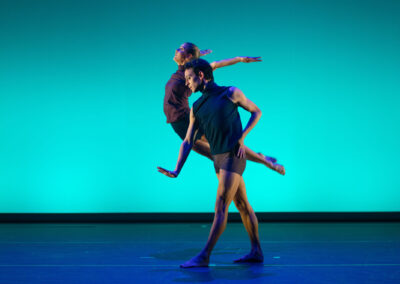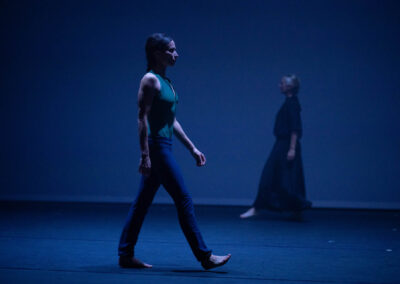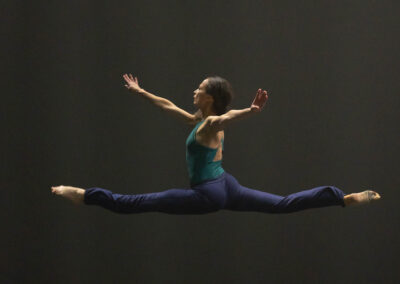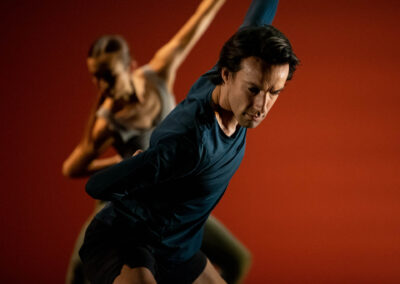★★★★
“Breathtakingly beautiful…A remarkable reminder of Cohan’s ability to make you look hard at movement and through very small inflections to let the personalities of the dancers emerge…The dancers are, as in every piece, superb.”
The Observer on Afternoon Conversations with Dancers
Past Present celebrates the return of life as we emerge from the pandemic: Yorke Dance Project returns to the Royal Opera House with our most important programme to date. Long delayed by Covid, PAST PRESENT honours the loss of Sir Robert Cohan with his final work created during lockdown & celebrates our heritage with works Martha Graham’s Lamentation and Kenneth MacMillan’s critically acclaimed Sea of Troubles. Artistic Director Yolande Yorke-Edgell premieres her new work in response to the loss of Cohan, her great friend and mentor whilst celebrating his legacy. Guest artists perform alongside our dedicated and passionate company dancers who have all emerged more powerful than ever to share this timely programme.
Past Present speaks to the enduring power of dance to express the triumph of the human spirit over fear, isolation & loss.
Past Present is dedicated to the loving memory of Hazel Yorke-Edgell (1947–2021), dancer, teacher, proud mother and constant supporter.
Programme Credits
Artistic Director Yolande Yorke-Edgell
Patron Richard Alston
Associate Director Stephen Pelton
Rehearsal Director Edd Mitton
Creative Learning Director Laura Dredger
Producer Natalie Allison
Production Manager Kate Elliott
Dancers Luke Ahmet, Eleanor Ferguson, Freya Jeffs, Edd Mitton, Abigail Attard Montalto, Oxana Panchenko, Nicholas Shikkis, Pierre Tappon, Yolande Yorke-Edgell
Guest Artists Jonathan Goddard, Romany Pajdak (The Royal Ballet)
Apprentice Abbie Pillans
Lamentation
(1930)
Choreography Martha Graham
Restaging Janet Eilber
Music Zoltán Kodály Neun Klavierstücke, Opus 3, Number 2
Original Costume and Lighting Martha Graham
Adapted Lighting Zeynep Kepekli
Lighting Programmer Imogen Clarke
Performed by Yolande Yorke-Edgell
Since its premiere in New York City in 1930, Lamentation has become one of the most recognisable dance works of the 20th century. Lamentation is a “dance of sorrow.” It is not the sorrow of a specific person, time, or place, but the personification of grief itself.
Sea of Troubles
(1988)
Choreography Kenneth MacMillan
Music Anton Von Webern Four Pieces for Violin and Piano, Opus No. 7. Bohuslav Martinů, Nocturne No. 3 for Cello and Piano, Piano Trio No. 3, Movements 1 & 2, Bergerette No. 3, Nocturne No. 2 for Cello and Piano
Design Deborah MacMillan
Lighting Reconstruction Adrian Plaut
Lighting Realisation Zeynep Kepekli
Lighting Programmer Imogen Clarke
Choreography Reconstruction Jane Elliot (Original Benesh Notator)
Coaching Susie Crow
Characters: Hamlet, Ophelia, Gertrude, Claudius, the Ghost of Hamlet’s Father and Polonius
Performed by Ellie Ferguson, Freya Jeffs, Oxana Panchenko, Luke Ahmet, Edd Mitton, Nicholas Shikkis
Kenneth MacMillan made Sea of Troubles in 1988 for Dance Advance, a dance ensemble composed of former members of The Royal Ballet. He intended it as a gift to the dancers, crafting an intimate work for just six performers. MacMillan described how his ballet responded to Shakespeare:
‘I have taken as a starting point the effect of the death of Hamlet’s father without a literal telling of the play. With the appearance of his father’s ghost, and Hamlet’s realisation of the need for revenge, his tormented world becomes a nightmare.’
The company’s revival of Sea of Troubles was created in collaboration with original cast member Susie Crow, original Benesh notator Jane Elliott and in full consultation with Deborah MacMillan.
Afternoon Conversations with Dancers
(Premiere)
Choreography Robert Cohan
Music Nils Frahm and Ólafur Arnalds
Design Zeynep Kepekli
Lighting Programmer Imogen Clarke
Friday 12 November, Performed by Edd Mitton, Freya Jeffs, Pierre Tappon, Yolande Yorke-Edgell, Romany Pajdak
Saturday 13 November, Performed by Edd Mitton, Freya Jeffs, Pierre Tappon, Yolande Yorke-Edgell, Oxana Panchenko
Sunday 14 November, Performed by Abigail Attard Montalto, Jonathan Goddard, Pierre Tappon, Yolande Yorke-Edgell, Oxana Panchenko
In 2019, after he had created his large group work Communion for TWENTY, Yorke Dance Project’s 20th anniversary season, Robert Cohan felt his next work should be a series of solos. He chose to call this new work Afternoon Conversations with Dancers as he liked to work in the afternoons — he felt he was at his best then — and the solos were created by giving movement suggestions, watching the dancers respond in their own way and so beginning a conversation. Cohan started working in November 2019 and completed three solos in the studio. By March 2020, Covid had struck and, at the age of 95, Cohan had to adapt his method of working in order to keep creating, which meant finishing the remaining solos via Zoom. Dancers worked with Yolande Yorke-Edgell in the studio while Cohan remained safe at home. Altogether, Cohan made eight solos, five of which are danced at each performance. His aim for each solo was to capture something about the dancer, observations he had made over years of working with them. Ultimately it is the voices of each artist and of Cohan himself which we see in these solos, a conversation in movement.
As lockdown continued and this stage premiere became further postponed, films of seven of the solos were made into a series of Lockdown Portraits. The films premiered at the Barbican in October and will be screened again in 2022.
So it is
(Premiere)
Choreography Yolande Yorke-Edgell
Music Nathaniel Dett Cinnamon Grove, Movement 2, Nephente and the Muse. Nicola Propora Meride e Selinute: Act II, Torbido intorno al core
Design Zeynep Kepekli
Lighting Programmer Imogen Clarke
Friday 12 and Saturday 13 November, performed by Edd Mitton, Yolande Yorke-Edgell, Luke Ahmet, Ellie Ferguson, Freya Jeffs, Abigail Attard Montalto, Nicholas Shikkis, Pierre Tappon
Sunday 14 November, performed by Jonathan Goddard, Yolande Yorke-Edgell, Luke Ahmet, Ellie Ferguson, Freya Jeffs, Abigail Attard Montalto, Nicholas Shikkis, Pierre Tappon
This work is inspired by Yorke-Edgell’s personal and professional collaboration with Robert Cohan. The dance captures the feeling of meeting him for the first time, the start of their work, the unfolding of our prolific time together, his impact on the company and the legacy that remains, compelling us to keep moving. The only statement you can make is to choreograph. Robert Cohan
